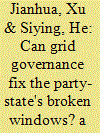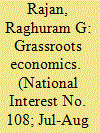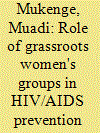|
|
|
Sort Order |
|
|
|
Items / Page
|
|
|
|
|
|
|
| Srl | Item |
| 1 |
ID:
142894


|
|
|
|
|
| Summary/Abstract |
In his 1988 essay, my late father, Yusif Sayigh, argued that the first Palestinian intifada had generated greater international understanding of the decades-long Palestinian struggle for national self-determination and support for the creation of an independent Palestinian state. This built on incremental shifts that had unfolded in response to diverse developments over the previous two decades, from the rise of the non-aligned movement in the 1970s, which helped secure a platform for the Palestine Liberation Organisation at the United Nations, to the grinding two-month Israeli siege of Beirut in 1982 and subsequent massacre of Palestinian refugees in the Sabra/Shatila camp. These developments galvanized Palestinians living under Israeli occupation in the West Bank, Gaza Strip, and East Jerusalem politically, and generated serious questioning of the feasibility of maintaining the occupation among many Israelis. But their cumulative impact was insufficient, in my father’s assessment, to bring about a decisive breakthrough in United States or, for that matter, in European policy.
|
|
|
|
|
|
|
|
|
|
|
|
|
|
|
|
| 2 |
ID:
186945


|
|
|
|
|
| Summary/Abstract |
Grid governance has been developed by the Chinese party-state to collect intelligence at the grassroots level for the early pre-emption of what it defines as social instability. Using data collected from four months’ participant observation and extensive interviews with personnel who work in the grid governance system in what we call W Street, a location in a second-tier city in southern China, this paper examines how China's grid governance is used for stability maintenance and how in practice the system has become alienated from its original purpose of social control. We find that grid governance is achieved mainly through three mechanisms: intelligence gathering, case coordination and real-time reporting for stability maintenance. We further reveal that while grid governance provides an important infrastructural power for intelligence gathering, the realization of this power could be hindered by contradictory logics among different levels of government. This research not only provides empirical data on how China's grid governance works in practice but also calls for a rethinking of the capacity of China's stability maintenance regime.
|
|
|
|
|
|
|
|
|
|
|
|
|
|
|
|
| 3 |
ID:
107137


|
|
|
| 4 |
ID:
106184


|
|
|
| 5 |
ID:
096971


|
|
|
| 6 |
ID:
184064


|
|
|
|
|
| Summary/Abstract |
For our special issue, ‘Radical Democratic Citizenship: From Practice to Theory’, we examine different forms of radical theorising and politics at the grassroots. Radical democratic citizenship entails forms of struggle against gross social, economic and political miseries and injustices. This special issue explores the implications of a renewed wave of revolutionary grassroots action. ‘Radical’ indicates firstly the potential for sustained fundamental change of the economic and political landscape that, secondly, is pursued from the grassroots, and, thirdly, through an egalitarian, democratic process that are transformative in rethinking and reshaping the parameters of what democracy can and should be. We raise the question of how localised alternatives -– which have been the most fertile terrain for such generation of different worlds – might be able to address wider questions of global inequality on our finite planet.
|
|
|
|
|
|
|
|
|
|
|
|
|
|
|
|
| 7 |
ID:
094360


|
|
|
| 8 |
ID:
152042


|
|
|
|
|
| Summary/Abstract |
This paper was written based on a research at the grassroots level which was aimed to look into: (1) the relative position of women vis-a-vis the process of making policies on the protection of women migrant workers; (2) what efforts women have made; (3) what efforts women can potentially make, based on their current positions; and (4) opportunities and challenges that may arise. In arguing for the importance of women’s empowerment in conducting protection efforts for Indonesian women migrant workers, the research made the activities of three women activists from Paguyuban Seruni in Banyumas, Indonesia the object of analysis. The efforts and roles were identified through in-depth interviews and observations. Through self-development, enriching process and optimal achievement, along with access to education and involvement in the democratization process at the grassroots level, the women activists have made a valuable contribution to the efforts of protecting women migrant workers at the grassroots level. There are limitations and problems that these women have to face, but they all become motivations for them to move forward and actually do something through a process where self and community achievement are interrelated. At this stage of the research, this paper is aimed to showcase the lessons learned and best practices identified from the grassroots level, in the search for efforts worth making, developing and duplicating, with the aim of protecting women migrant workers working in the informal sector.
|
|
|
|
|
|
|
|
|
|
|
|
|
|
|
|
| 9 |
ID:
124512


|
|
|
|
|
| Publication |
2013.
|
| Summary/Abstract |
The unique experiences of women and girls in conflict situations have been highlighted in key research over the past two decades,1 warranting the need for a gendered approach in post-conflict reconstruction processes. This article focuses on the emergence of HIV in such settings and highlights the contributions of women's groups to HIV interventions and policy formulation, using case studies from Sierra Leone and the Democratic Republic of the Congo (DRC). The article argues for the need for a much deeper gender analysis in HIV intervention strategies, and concludes with recommendations to ensure access to justice and health services for women.
|
|
|
|
|
|
|
|
|
|
|
|
|
|
|
|
| 10 |
ID:
144569


|
|
|
|
|
| Summary/Abstract |
This article assesses stability maintenance (weiwen) as a means of conflict resolution in China. It argues that the resolution of local disputes in China, particularly outside cities, is now being influenced and facilitated by the discourse and practice of stability maintenance, rather than legal methods and traditional mediation processes. This conclusion adds to the existing academic views of stability maintenance, which have previously emphasized social control to the exclusion of almost all else, and suggests that stability maintenance-focused conflict resolution may have practical benefits to Chinese citizens, given the state’s withdrawal from legal conflict resolution methods and its ambiguous attitude towards mediation.
|
|
|
|
|
|
|
|
|
|
|
|
|
|
|
|
|
|
|
|
|